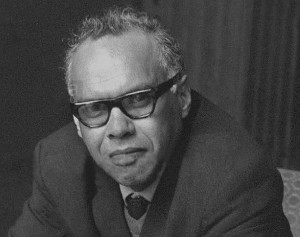




|
Alex La
Guma
(1925-1985)
 South African communist writer
born in District Six, Cape Town. After becoming a member of a
labor union in 1945, he was fired from his job for organizing
a strike. Joined the Young Communists League in 1947 and the
South African Communist Party in 1948. A defendant in the
famous Treason Trial organized by the racist government
against anti-apartheid figures, he left South Africa in 1966
and lived the rest of his life in exile.
Novels: And a Threefold Cord (1964): 116 pages The Stone Country (1967): 161 pages In the Fog of the Seasons End (1972): 184 pages Time of the Butcherbird (1979): 121 pages Short Stories: A Matter of Taste (1962): Short story that makes the point that no matter your background or "race" we are all brothers. The biggest difference between the people of the earth is class, the difference between the rich and the poor. At the Portagee's (1962): Brief snapshot of life in apartheid South Africa and of the petty humiliations and suffering, as well as the happiness that people nevertheless struggled for. A Walk in the Night (1962): 92 pages Blankets (1962): A quick portrait of a poor, underclass South African, as understood by the blankets he has used throughout his life. Tattoo Marks and Nails (1962): Briefly details the poor conditions common in prisons till today, and also attacks those who do not practice solidarity with their companions in suffering and who don't stay united in the face of oppression. The Gladiators (1962): Attack on the barbaric "sport" of boxing and how it brings out the basest instincts in those who go to see it, very little difference with the gladiators of Roman times. Also criticizes the "racial superiority" that some light-skinned people of color believe in, especially in extremely racist countries like South Africa and amerika. Also points out the racist elements in boxing, with fights often turned into a theoretical fight between "races" or an enjoyment of watching people from another "race" massacre each other. The Lemon Orchard (1962): Attack on the horrific racism of apartheid South Africa and how the white racists felt that they could do anything they wanted to people of color. Also points out how useless the bourgeois "justice" system is to fight a racist system. A Glass of Wine (1963): Written about the horrible injustice that was apartheid and how it illogically and inhumanly separated people in love and made their lives miserable. Nocturne (1963): About the beautiful things that cost nothing, yet are denied to the poor, who suffer through life while being denied life's pleasures. Out of the Darkness (1963): A passionate attack on apartheid and it's racist idiocy that spread to infect all parts of life for the people who suffered under it. Also exposes the barbaric conditions that were "normal" in it's prisons and the racist abuse prisoners were forced to deal with. Slipper Satin (1963): Shows how destructive and evil the apartheid laws against "racial-mixing" were and their widespread effects. Also points out a common misogynist, racist attitude present to this day in many places: if a man dates or marries a woman from a different background it is not a problem, however if a woman does it she is a whore, a traitor, someone who hates her "race" or background, etc, instead of just someone who is in love with another human being. |